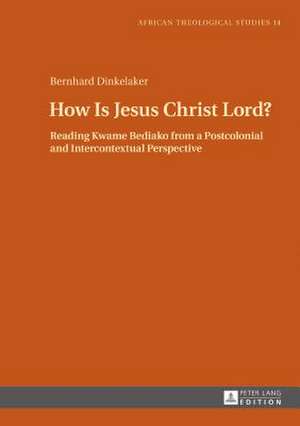How Is Jesus Christ Lord?: African Theological Studies / Etudes Theologiques Africaines
Autor Bernhard Dinkelakeren Limba Engleză Hardback – 29 oct 2017
Preț: 758.65 lei
Preț vechi: 1039.24 lei
-27% Nou
Puncte Express: 1138
Preț estimativ în valută:
145.16€ • 151.97$ • 120.12£
145.16€ • 151.97$ • 120.12£
Carte tipărită la comandă
Livrare economică 05-19 aprilie
Preluare comenzi: 021 569.72.76
Specificații
ISBN-13: 9783631730508
ISBN-10: 3631730500
Pagini: 576
Dimensiuni: 159 x 217 x 40 mm
Greutate: 0.86 kg
Ediția:Nouă
Editura: Peter Lang Copyright AG
Seria African Theological Studies / Etudes Theologiques Africaines
ISBN-10: 3631730500
Pagini: 576
Dimensiuni: 159 x 217 x 40 mm
Greutate: 0.86 kg
Ediția:Nouă
Editura: Peter Lang Copyright AG
Seria African Theological Studies / Etudes Theologiques Africaines
Notă biografică
Bernhard Dinkelaker studied Theology and Educational Science at the Universities of Tübingen, Münster/Westf., Birmingham and Heidelberg. He served in diaconal work and in parishes in Germany, in an ecumenical programme in Ghana, as General Secretary in an international mission association, and as a lecturer in Cameroon.
Descriere
Kwame Bediako (1945-2008) from Ghana claims a space for Africa in academic theology. He analyses issues of Christology and identity, of mission, culture and language, of a . He sees Africa as a for World Christianity. The book analyses Bediako's work from a postcolonial and intercontextual perspective.











